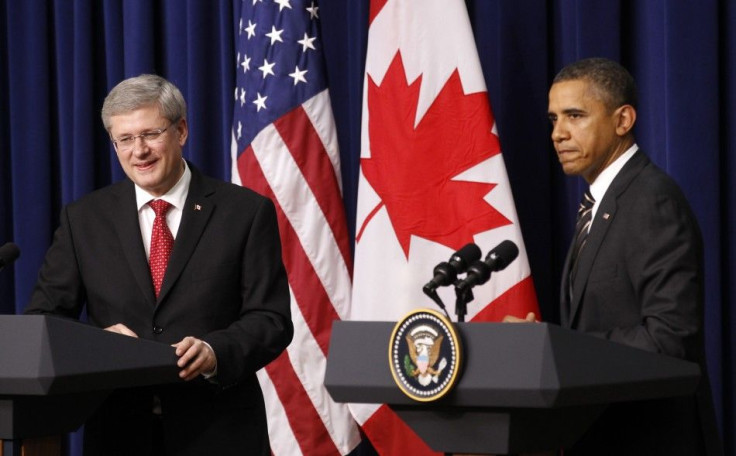Obama has options to delay Keystone pipeline

President Barack Obama has options to kill or delay the Canada-to-Texas oil sands pipeline despite language in the payroll tax bill that forces him to make a decision on a permit by late February.
Obama signed into law on Friday the bill containing a measure ordering him to grant the permit for TransCanada Corp's Keystone XL oil sands pipeline in 60 days, unless he determines the line does not serve the national interest.
The project now faces further uncertainty following its entanglement in Congressional maneuvering around the payroll tax extension legislation, Robert Johnston, a director for energy and natural resources at the Eurasia Group, said in a research note.
Last month, Obama bowed to pressure from environmentalists, who are an important part of his base, to delay the project past the 2012 election.
Thousands of them staged high-profile protests at the White House this year to stop the pipeline that would deliver oil sands crude from the boreal forests of Alberta to refineries in Texas.
In November, the State Department, which has the power to give the project a final permit because it would cross the national border, announced it would delay its decision until after next year's presidential election.
Environmentalists oppose the project for the carbon emissions that come from processing oil sands. The line's route also faced stiff opposition from greens and Republicans in Nebraska because of concerns a pipeline spill would contaminate a huge aquifer that serves millions and spoil the state's fragile Sandhills region.
Pipeline supporters say Keystone would bolster U.S. energy security and relieve a buildup of crude in the Midwest. TransCanada claims it would create 20,000 jobs, though the State Department said the number is closer to 7,000.
Despite the language in the tax package, Obama can kill the project and likely can still delay it. He could reject it based on the national interest argument, or he could give it a thumbs up, but delay it by awaiting a route study.
If Obama decides the pipeline is not in the national interest, it would effectively be the end of the project, said Johnston, although TransCanada would likely still move forward with a smaller leg of the pipeline from the Cushing, Oklahoma oil hub to Texas.
Even if Obama approves it within 60 days, he could do so conditionally by declaring the project is in the national interest, but contingent on the completion of the State Department's study on alternative routes through Nebraska.
The State Department based its delay in November on a need to study alternative routes in Nebraska.
That decision came a day after some 10,000 environmentalists and other opponents of Keystone circled the White House in protest.
Obama did not mention Keystone at a brief press conference on Friday after he signed the bill. But earlier this month White House officials said the congressional maneuvering does not help the project.
Dan Pfeiffer, a White House communications director, tweeted before the Senate passed its version of the payroll tax bill last week: How will (Republicans) explain to their members that the bill doesn't force the President to approve Keystone, it essentially kills it?
Daniel Weiss, of the Center for American Progress, said last week that even if Obama approves the line, it would not survive the court process, as U.S. law clearly states that environmental impact statements have to be fully completed before the government can determine whether a project is in the national interest.
If Obama kills the project, Republicans would likely try to use that against him in the campaign, particularly if oil prices rise next summer due to strife in the Middle East or other reasons, and as the jobless rate remains stubbornly high.
TransCanada, whose stock rose 1.6 percent on Friday and was higher than the overall market, maintains it wants to proceed with the project. It said because of demand from shippers, it has boosted capacity of the pipeline to 800,000 barrels per day from 700,000 bpd.
The oil industry will be strongly pushing the project, in part to relieve a flood of crude that is bottled up at Cushing, Oklahoma, on a shale oil bonanza in North Dakota and a lack of pipeline capacity.
It's another step in a muddled battle over the pipeline, but at least this means we're closer to a decision, said Peter Beutel, an energy analyst at Cameron Hanover in New Canaan, Connecticut.
Environmentalists, who vow to keep fighting the line, slammed Republicans in Congress for including the pipeline rider in the legislation.
It is bad policy because it is likely to force the Obama Administration to turn down the application without further analysis, said David Moulton, the senior director for legislative affairs at the Wilderness Society.
In essence, (Republicans in the House) have now created a scenario where the Keystone XL pipeline must be rejected on the basis of procedure rather than on the merits.
© Copyright Thomson Reuters 2024. All rights reserved.



















